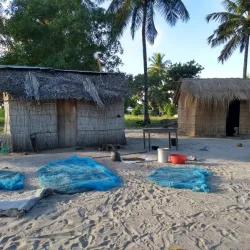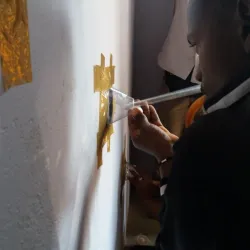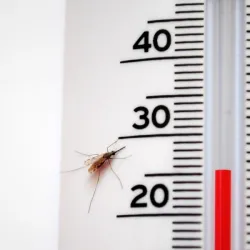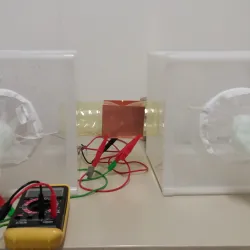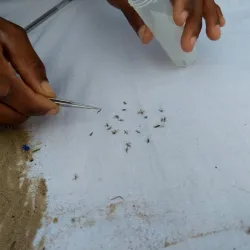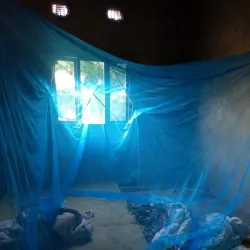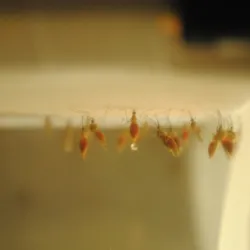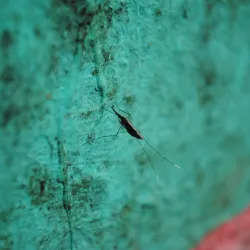Krijn Paaijmans
-
Phone: 480-965-2139
-
-
Life Sciences E (LSE) Rm. 409. MC: 1701 Tempe, AZ 85287
-
Mail code: 4501Campus: Tempe
-
Krijn Paaijmans is a disease ecologist with a strong interest in how the biology and ecology of parasites, viruses and insect vectors shape the distribution and intensity of infectious diseases (such as malaria and Zika). His translational research aims to better inform disease control and prevention programs with the ultimate aim to reduce disease morbidity and mortality.
Professor Paaijmans and his team study the biology and behavior of disease vectors (e.g. mosquito development, blood-feeding behavior and vector competence) to design new tools and/or strategies for mosquito surveillance and control. To illustrate, his team - together with various partners around the world - is currently developing and piloting a novel vector control approach that uses high power pulsed electric fields to prevent mosquitoes from biting their human host.
He is also the head of the Entomology Platform at the Manhiça Health Research Centre in southern Mozambique. As a member of the Mozambican Alliance Towards the Elimination of Malaria (MALTEM), he coordinates the malaria elimination entomological monitoring and participates in evaluating tools and strategies to interrupt transmission of P. falciparum and eliminate its reservoir. He works closely with the Mozambican Ministry of Health and its partners, and is actively involved in strengthening the capacity in medical entomology in the country.
Professor Paaijmans is interested in mentoring students and scientists in the following areas of translational research: (i) new tools or strategies for vector monitoring and control, (ii) insecticide resistance in mosquito vectors and (iii) climate (change) and vector-borne diseases.
2003-2007 PhD in Medical Entomology
Wageningen University, The Netherlands
Meteorology and Air Quality | Laboratory of Entomology
1997-2002 BSc and MSc in Biology
Wageningen University, The Netherlands
The research of the Paaijmans lab focusses on anopheline mosquitoes and the malaria parasites they transmit, and is organised around the following themes:
1. Malaria elimination entomological monitoring
2. Insecticide resistance in mosquito vectors
3. New tools for vector monitoring and control
4. Climate (change) and vector-borne diseases
The Paaijmans lab conducts academic translational research on the surveillance and control of mosquito vectors of infectious diseases (e.g. malaria, Zika) with the aim to reduce disease morbidity and mortality. More specifically, Professor Paaijmans works on: (1) Designing and testing novel tools for mosquito surveillance and control through an improved understanding of vector biology and behavior, and (2) Designing and piloting improved mosquito surveillance strategies that provide more timely, accurate and actionable information with the aim to improve vector control strategies.
For the last seven years, Professor Paaijmans has been involved in the design, implementation and evaluation of different entomological studies as part of the Mozambican Alliance towards the Elimination of Malaria (MALTEM), currently ongoing in Southern Mozambique. He works closely with the entomologists of the National Malaria Control Program and its partners in Mozambique.
Malaria elimination entomological monitoring
- M Máquina, MA Opiyo, N Cuamba, D Marrenjo, M Rodrigues, S Armando, S Nhate, F Luis, F Saúte, B Candrinho, NF Lobo & KP Paaijmans. Multiple Anopheles species complicate downstream analysis and decision-making in a malaria pre-elimination area in southern Mozambique. Malaria Journal, 2024
- KP Paaijmans & NF Lobo. Gaps in protection: the actual challenge in malaria elimination. Malaria Journal, 2023
- M Opiyo, E Sherrard-Smith, A Malheia, A Nhacolo, C Sacoor, A Nhacolo, M Máquina, L Jamu, N Cuamba, Q Bassat, F Saúte & K Paaijmans. Household modifications after the indoor residual spraying (IRS) campaign in Mozambique reduce the actual spray coverage and efficacy. PLoS Global Public Health, 2022
Insecticide resistance in mosquito vectors
- NB Jobe, S Huijben & KP Paaijmans. Non-target effects of chemical malaria vector control on other biological and mechanical infectious disease vectors. The Lancet Planetary Health, 2023
- A Namias, N Bassin Jobe, KP Paaijmans & S Huijben. The need for practical insecticide-resistance guidelines to effectively inform mosquito-borne disease control programs. eLife, 2021
- KP Paaijmans & Silvie Huijben. Taking the ‘I’ out of LLINs: using insecticides in vector control tools other than long-lasting nets to fight malaria. Malaria Journal, 2020,19:73
- S Huijben & KP Paaijmans. Putting evolution in elimination: winning our ongoing battle with evolving malaria mosquitoes and parasites. Evolutionary Applications, 2018
New tools for vector monitoring and control
- NB Jobe, A Chourasia, BH Smith, E Molins, A Rose, TP Pavlic & KP Paaijmans. Using electric fields to control insects: Current applications and future directions. Journal of Insect Science, 2024
- NB Jobe, S Huijben, JB Will Jr, J Townsend & KP Paaijmans. Comparing the efficiency of different carbon dioxide sources in collecting mosquito vector species on the Tempe campus of Arizona State University. Journal of the American Mosquito Control Association, 2023
Climate (change) and vector-borne diseases
- KD Glunt, JI Blanford & KP Paaijmans. Chemicals, climate and control: Increasing the effectiveness of malaria vector control tools by considering relevant temperatures. PLoS Pathogens, 2013
- KP Paaijmans, JI Blanford, RG Crane, ME Mann, L Ning, KV Schreiber & MB Thomas. Downscaling reveals diverse effects of anthropogenic climate warming on the potential for local environments to support malaria transmission. Climatic Change, 2014
- KP Paaijmans, RL Heinig, RA Seliga, JI Blanford, S Blanford, CC Murdock & MB Thomas. Temperature variation makes ectotherms more sensitive to climate change. Global Change Biology, 2013
Courses
2025 Fall
| Course Number | Course Title |
|---|---|
| BIO 492 | Honors Directed Study |
| MIC 495 | Undergraduate Research |
| BIO 495 | Undergraduate Research |
2025 Summer
| Course Number | Course Title |
|---|---|
| BIO 320 | Fundamentals of Ecology |
| BIO 320 | Fundamentals of Ecology |
| BIO 321 | Introductory Ecology Lab |
| BIO 321 | Introductory Ecology Lab |
2025 Spring
| Course Number | Course Title |
|---|---|
| BIO 320 | Fundamentals of Ecology |
| BIO 493 | Honors Thesis |
| MIC 495 | Undergraduate Research |
| MBB 495 | Undergraduate Research |
| BIO 495 | Undergraduate Research |
2024 Fall
| Course Number | Course Title |
|---|---|
| BIO 492 | Honors Directed Study |
| MIC 495 | Undergraduate Research |
| BIO 495 | Undergraduate Research |
| BIO 394 | Special Topics |
2024 Spring
| Course Number | Course Title |
|---|---|
| BIO 320 | Fundamentals of Ecology |
| BIO 493 | Honors Thesis |
| MIC 495 | Undergraduate Research |
| BIO 495 | Undergraduate Research |
2023 Fall
| Course Number | Course Title |
|---|---|
| BIO 492 | Honors Directed Study |
| MIC 495 | Undergraduate Research |
| BIO 495 | Undergraduate Research |
| BIO 394 | Special Topics |
| ASM 394 | Special Topics |
2023 Spring
| Course Number | Course Title |
|---|---|
| BIO 320 | Fundamentals of Ecology |
| BIO 493 | Honors Thesis |
| MIC 495 | Undergraduate Research |
| BIO 495 | Undergraduate Research |
2022 Fall
| Course Number | Course Title |
|---|---|
| BIO 492 | Honors Directed Study |
| MIC 495 | Undergraduate Research |
| BIO 495 | Undergraduate Research |
2022 Spring
| Course Number | Course Title |
|---|---|
| BIO 320 | Fundamentals of Ecology |
| BIO 493 | Honors Thesis |
| MIC 495 | Undergraduate Research |
| BIO 495 | Undergraduate Research |
2021 Fall
| Course Number | Course Title |
|---|---|
| BIO 492 | Honors Directed Study |
| MIC 495 | Undergraduate Research |
| BIO 394 | Special Topics |
| ASM 394 | Special Topics |
2021 Spring
| Course Number | Course Title |
|---|---|
| BIO 320 | Fundamentals of Ecology |
| BIO 493 | Honors Thesis |
| BIO 495 | Undergraduate Research |
2020 Fall
| Course Number | Course Title |
|---|---|
| BIO 492 | Honors Directed Study |
| BIO 394 | Special Topics |
| ASM 394 | Special Topics |


